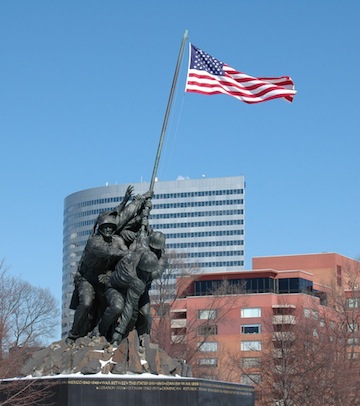It’s a sad story although that’s not how it started off. They met, they fell in love, they married, they were ridiculously happy in that “How do we even deserve this?” kind of way.
Then he got called to serve in Iraq.
And he went; it’s what he signed up to do, and he was proud and honored to serve. 
But when he returned, he wasn’t the same. She knew it and he knew it, but he couldn’t quite control what was going on. It got angry, it got violent, it got ugly. When she told him she was scared, that she was thinking about a divorce, he agreed — he wasn’t going to get better any time soon. He didn’t want to hurt her but he wasn’t healthy enough to stop hurting himself.
So they split.
They aren’t the only ones. Post-9/11 veterans are returning home with a host of problems, everything from sexual dysfunction to post-traumatic stress (PTS). According to the Pew Research Center, almost half of all vets (46 percent) say they’re living with PTS; the Veterans Administration puts the number between 10 percent and 18 percent and the Institute of Medicine says 13 percent to 20 percent have symptoms of PTS. Many more go undiagnosed or unreported.
There’s no way to know what that may mean down the road for the married vets with PTS, but if it’s anything like the experience of veterans who returned from Vietnam, we may see a huge jump in the divorce rate in the next few years. According to the VA, about 38 percent of Vietnam veteran’s marriages ended within six months of their return. Vietnam veterans with PTS divorced two times more than veterans without PTS, and they were three times more likely to divorce two or more times.
But while coming home to a wife was beneficial to veterans returning to civilian life after serving in Vietnam or the Korean War/World War II era, or in periods between, being married isn’t helping post-9/11 veterans readjust; in fact, “post-9/11 veterans who were married while they served had a significantly more difficult time readjusting than did married veterans of past eras or single people regardless of when they served. … being married while serving reduces the chances of an easy re-entry from 63% to 48%,” according to Pew.
Why?
Deployment to Iraq and Afghanistan, the longest combat operations since Vietnam, added huge stress on many vets’ marriages:
“Nearly half (48%) say the impact was negative, and this group is significantly more likely than other veterans to have had family problems after they were discharged (77% vs. 34%) and to say they had a difficult re-entry. Among those married while they were in the service, about six-in-ten (61%) post-9/11 veterans who had experienced marital problems while deployed also had a difficult re-entry. In contrast, about four-in-ten veterans (39%) who reported that deployments had a positive or no impact on their marriage say they had problems re-entering civilian life.”
PTS isn’t the only challenge facing post 9/11 vets — some 40,000 have been diagnosed with traumatic brain injury (TBI) from combat (and tens of thousands more from non-combat). Brain injury brings with it its own complications, including drastic personality changes, all of which can challenge a marriage. Recent studies indicate that about 25 percent of those who have TBI end up divorced or separated.
The veterans aren’t the only ones having a hard time readjusting; spouses caring for a veteran with PTS report more anxiety, depression and a sense of helplessness. They need support to not only help their spouse adjust, but also for themselves.
It’s clear that some marriages may be yet another casualty of the Iraq and Afghanistan wars; I can only hope that we don’t add another layer of strain on those marriages by labeling them as failed marriages.
This Sunday is Veterans Day, a day when we honor and thank those who have served. Perhaps we should have some compassion for their spouses, too.
- What has been your experience with/as a returning veteran?
- Are we doing enough to help military families adjust?
















